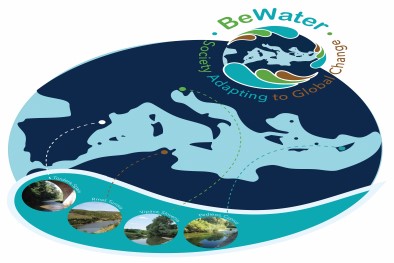The BeWater Project moves in this direction by promoting dialogue and collaboration between science and society for sustainable water management and adaptation to the global change impacts. BeWater is putting into process a transition from a technologically-focused river basin management approach to a stakeholder driven, bottom-up process ensuring that social empowerment and joint responsibility are key considerations when confronting the emerging global change challenges with proactive responses.
12 partners[1] joined forces in October 2013 to implement “BeWater: Making society an active participant in water adaptation to global change”, a 3.5-year multi-actor project running until March 2017, with a €3.6 million funding – €2.9 million out of which from the European Commission, in the context of its 7th Framework Program. Using as case studies four River Basins in Pedieos (Cyprus), Vipava (Slovenia), Tordera (Spain) and Rmel (Tunisia), BeWater aims to promote shared learning for multi-level impact, via information, knowledge and experience exchange at local, project and European level.
Whether it is forest fires and tree mortality, aquifer overexploitation, temperature and precipitation changes, drought and flood cycles, desertification, erosion and salinization, rising water demand and economic consequences; all four river basins are faced with diverse water-related socio-ecological vulnerabilities.
Participatory workshops involving local stakeholders, scientific partners and public administration representatives in the four river basins contributed to each basin identifying its own global change challenges. Scientific partners are currently designing potential water management options to address these by leveraging all available information, which will then be validated together with local stakeholders. The most feasible options will be prioritized and used as the basis for a river basin adaptation plan.

The BeWater iterative process, with information exchanged back and forth between the involved scientific partners’ knowledge on global change impacts at river basin level and the river basin local societies’ perspective of current water management challenges throughout the course of the project enables evaluation, enrichment and validation of the project findings. This mutual learning process emphasises the need to change by accommodating current conditions and to ‘learn by doing’.
In this framework, BeWater empowers citizens to learn more about adaptive water management, to share their knowledge and experience with the Project consortium and the scientific community, and become actively involved in the implementation of the adaptive water management plan. In order to engage wider society in the process, encourage social awareness and capacity building in water management challenges, as well as enrol civil society in the identification of challenges, problems, needs and constraints at local level, the Global Water Partneship – Mediterranean (GWP-Med) is holding the BeWater Awareness Campaign throughout the four Case Study River Basins (CSRBs), in cooperation with each CSRB. It has planned, designed and produced a series of tailor-made sensitisation materials, including posters and roll-up banners, to be disseminated by CSRB teams ahead and during various events aimed at both the general public, as well as more specialised audiences, such as local schools and administrative bodies, throughout the project's development.
Posters distributed in the local language of each river basin called for citizens to "become active BeWater Partners" by sharing their knowledge, experience, needs and concerns with the scientific community, while a mobile roll-up banner exhibition highlighted the project's identity and objectives by presenting the water-related socio-ecological vulnerabilities resulting from global change that are challenging the Mediterranean Region, while proposing adaptive water management as a solution to build resilience and an innovative, iterative methodological approach to leverage its advantages.

The ultimate BeWater outcome will be to formulate concrete proposals of local, case-study river basin context, which will be translated into generic adaptation guidelines and policy models of national and international relevance, with the potential to be taken into consideration by competent authorities involved in future decision-making processes and to be applied in further river basins in the Mediterranean or around the world.
[1] Anbessa Environmental Consulting (AEC) – Italy, Centre for Ecological Research and Forestry Applications (CREAF) – Spain, Corporation Blue (CBLUE) – Netherlands, Ecologic Institute (Ecologic) – Germany, Europe for Business (EFB) - United Kingdom, European Forest Institute, Mediterranean Regional Office (EFIMED) – Spain, Global Water Partnership – Mediterranean (GWP-Med) – Greece, Institute for Water of the Republic of Slovenia (IZVRS) – Slovenia, Joint Research Centre – European Commission (JRC) – Italy, National Research Institute of Rural Engineering, Water and Forests (INRGREF) – Tunisia, Prospex BVBA (Prospex) – Belgium, The Cyprus Institute (CyI) - Cyprus
